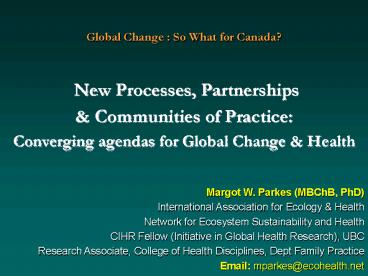Global Change : So What for Canada - PowerPoint PPT Presentation
1 / 20
Title:
Global Change : So What for Canada
Description:
New settings' & opportunities for education and action. Canadian initiatives and innovations: ... promoting collaborations (Brasil, Nepal, India, Peru) ... – PowerPoint PPT presentation
Number of Views:35
Avg rating:3.0/5.0
Title: Global Change : So What for Canada
1
Global Change So What for Canada?
- New Processes, Partnerships
- Communities of Practice
- Converging agendas for Global Change Health
Margot W. Parkes (MBChB, PhD) International
Association for Ecology Health Network for
Ecosystem Sustainability and Health CIHR Fellow
(Initiative in Global Health Research),
UBC Research Associate, College of Health
Disciplines, Dept Family Practice Email
mparkes_at_ecohealth.net
2
Overview
- Responding to Global Change through
- New Partnership Multi-stakeholder Processes
- Linking Knowledge Exchange Equity
- Whos voices, when and how?
- Releasing Capacity
- New settings opportunities for education and
action. - Canadian initiatives and innovations
- Network for Ecosystem Sustainability Health
- A Canadian Community of Practice in EcoHealth
3
Global Change Health Who are the Vulnerable?
Source Cynthia Haq MD, Faculty of Medicine,
University of Wisconsin
4
PROCESSES Global Health Governance?
- Global Health Governance seeks to address the
broad determinants of health, extending its reach
to health impacts from non-health sectors, such
as trade and finance, and environment across
multiple levels of governance.
Global health promotion can be defined as the
process of enabling people to increase control
over, and to improve, their health within an
increasingly global context.
Kelley Lee (2006) Global health promotion how
can we strengthen governance and build effective
strategies? Health Promotion International, Vol.
21 No. S1, In Press
5
Multi-stakeholder Processes
Horizontal and Vertical Integration
- Communities and Cultures
- Practitioners and field workers
- Pertinent disciplines
- Sectors (Health, Finance, Environment,
Agriculture) - Units of Governance (local global)
Parkes et al, (2005) All Hands on Deck TD
approaches to EID, EcoHealth
6
Non-Government Organisations
- Under United Nations terminology, the definition
of NGO has meant any non-governmental group
including profit, non-profit, indigenous, labour
and other groups . (IISD, Canada
and Agenda 21) - Evolving context and types
- INGO, ENGO, BINGO, QUANGO, GONGO
- Non-Profit Organisations, Civil Society
Organisations - Networks Communities of Practice
7
NGO/NPOS Recognition, Roles, Tensions
- We define non-government organizations (NGO) as
organizations that work on a voluntary basis
rely on external funding work with the poor and
marginal members of society have a small staff
and have a flexible, not-for-profit, independent,
and non-partisan nature (cf. Korten 1990). The
urban and middle class nature of most NGOs as
well as their dependence on funding from outside
sources places their independence and performance
in doubt. - (Fox et al 2005, Mapping Communities)
8
KNOWLEDGE EQUITY Whose voice?
Knowledge-base
POWER, ACCESS, EQUITY?
stories
case-studies
agendas
shared goal GLOBAL HEALTH SUSTAINABILITY
Holistic knowledge
Adapted from Brown et al, 2001, Grass Roots and
Common Ground
9
(No Transcript)
10
CAPACITY? via Communities of Practice
- Communities of Practice are groups of people who
share a concern or a passion for something they
do and learn how to do it better as they interact
regularly . (Wenger, 2007) - a response to community/professional demand, and
inadequacy of isolated approaches - results/goal oriented
- can serve to develop and evolve knowledge and
innovative ideas
11
Toward Communities of Practice in EcoHealth?
12
Toward Communities of Practice in EcoHealth?
13
Toward Communities of Practice in EcoHealth?
Types of Knowledge (Voices)?, Equity?, Capacity?
14
Canadian Initiatives NESH
- Network for Ecosystem Sustainability Health
- Founded mid-1990s by James Kay, David
Waltner-Toews and David Cressman - A NGO/NPO "to foster a global vision of
sustainable, equitable and enjoyable development
while maintaining the health and integrity of
ecosystems at the local level. By - promoting collaborations (Brasil, Nepal, India,
Peru) - providing educational opportunities,
- providing peer review, and
- disseminating the relevant findings of network
members
15
Canadian Initiatives NESH
- New Settings EcoHealth Watersheds
- IDRC funded project with IISD
- Watersheds as setting for health sustainability
- Water management the determinants of health?
- Interns with Watershed NGOs in Costa-Rica
- RioArte / Coope-Agri NESH/York U.
- Building Community-University Research
Partnerships in Canada the Caribbean - Canadian Caribbean Watershed Groups, NGO/NPOs,
Public Health agencies Researchers
16
A Canadian Community of Practice in EcoHealth
- A common need identified by IDRC
practitioners, the proposed COPEH-Can aims to - jointly design, deliver and evaluate a
pan-Canadian ecoheath training Program - Focused on International Development context
- provide a forum for Canadians to
consolidate/extend the ecohealth approach - South-North, North-North, South-South
collaboration - identify and develop strategies for long-term
regional and institutional capacity
17
A Canadian Community of Practice in Ecohealth
(CoPEH-Can)
- A decentralized network regional nodes
- Progressive development of training network
- Evaluation of capacity building (network and
training)
18
Issues Challenges
- Trying to do the same things better.
- or to do better things?
- Time, P/politics, inertia . Why bother?
- Aspirational? or genuinely shared goals?
- Ecosystem change the social determinants of
health? Joining the dots? - Capacity for Collaborative Learning? Within,
across and between.
19
(No Transcript)
20
Back to the Themes of the Day
- How are we setting out to meet the challenges of
global change? Are our processes adequate? - Are we using knowledge effectively to ensure we
address the key issues? - Are equity concerns receiving adequate
consideration alongside technical issues? - Are we building global capacities for meeting
global challenges that connect to local levels?































